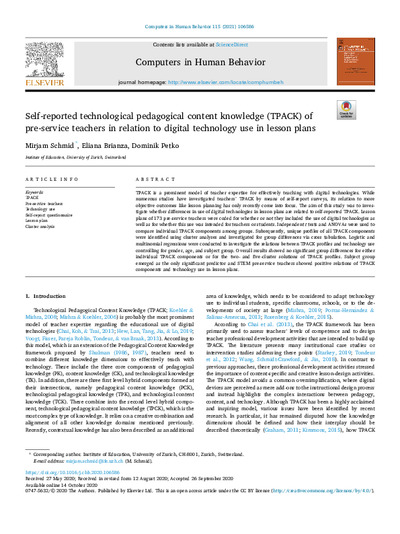Self-reported technological pedagogical content knowledge (TPACK) of pre-service teachers in relation to digital technology use in lesson plans Publikationsdatum:
|
 |
 Diese Seite wurde seit mehr als 7 Monaten inhaltlich nicht mehr aktualisiert.
Unter Umständen ist sie nicht mehr aktuell.
Diese Seite wurde seit mehr als 7 Monaten inhaltlich nicht mehr aktualisiert.
Unter Umständen ist sie nicht mehr aktuell.
 Zusammenfassungen
Zusammenfassungen
 TPACK is a prominent model of teacher expertise for effectively teaching with digital technologies. While
numerous studies have investigated teachers’ TPACK by means of self-report surveys, its relation to more
objective outcomes like lesson planning has only recently come into focus. The aim of this study was to investigate
whether differences in use of digital technologies in lesson plans are related to self-reported TPACK. Lesson
plans of 173 pre-service teachers were coded for whether or not they included the use of digital technologies as
well as for whether this use was intended for teachers or students. Independent t tests and ANOVAs were used to
compare individual TPACK components among groups. Subsequently, unique profiles of all TPACK components
were identified using cluster analyses and investigated for group differences via cross tabulation. Logistic and
multinomial regressions were conducted to investigate the relations between TPACK profiles and technology use
controlling for gender, age, and subject group. Overall results showed no significant group differences for either
individual TPACK components or for the two- and five-cluster solutions of TPACK profiles. Subject group
emerged as the only significant predictor and STEM pre-service teachers showed positive relations of TPACK
components and technology use in lesson plans.
TPACK is a prominent model of teacher expertise for effectively teaching with digital technologies. While
numerous studies have investigated teachers’ TPACK by means of self-report surveys, its relation to more
objective outcomes like lesson planning has only recently come into focus. The aim of this study was to investigate
whether differences in use of digital technologies in lesson plans are related to self-reported TPACK. Lesson
plans of 173 pre-service teachers were coded for whether or not they included the use of digital technologies as
well as for whether this use was intended for teachers or students. Independent t tests and ANOVAs were used to
compare individual TPACK components among groups. Subsequently, unique profiles of all TPACK components
were identified using cluster analyses and investigated for group differences via cross tabulation. Logistic and
multinomial regressions were conducted to investigate the relations between TPACK profiles and technology use
controlling for gender, age, and subject group. Overall results showed no significant group differences for either
individual TPACK components or for the two- and five-cluster solutions of TPACK profiles. Subject group
emerged as the only significant predictor and STEM pre-service teachers showed positive relations of TPACK
components and technology use in lesson plans. Dieser wissenschaftliche Zeitschriftenartikel erwähnt ...
Dieser wissenschaftliche Zeitschriftenartikel erwähnt ...
 Personen KB IB clear | Mete Akcaoglu , David Dunning , Erica R. Hamilton , Royce Kimmons , Matthew J. Koehler , Justin Kruger , Punya Mishra , Margaret L. Niess , Michael Polanyi , Christopher R. Rakes , Robert N. Ronau , Joshua M. Rosenberg , Tae Seob Shin , L. Shulman | |||||||||||||||||||||||||||||||||||||||||||||||||||||||||||||||||||||||||||||||||
 Begriffe KB IB clear | Content KnowledgeContent Knowledge
,  LehrerIn LehrerIn teacher
, LehrerInnen-Bildungteacher training
, Pedagogical Content Knowledge (PCK)Pedagogical Content Knowledge
, Pedagogical KnowledgePedagogical Knowledge
, Soziale Erwünschtheit
, Technological Content Knowledge (TCK)Technological Content Knowledge
, Technological pedagogical content knowledge (TPCK)Technological pedagogical content knowledge
, Technological Pedagogical Knowledge (TPK)Technological Pedagogical Knowledge
, Technology KnowledgeTechnology Knowledge
, teacher
, LehrerInnen-Bildungteacher training
, Pedagogical Content Knowledge (PCK)Pedagogical Content Knowledge
, Pedagogical KnowledgePedagogical Knowledge
, Soziale Erwünschtheit
, Technological Content Knowledge (TCK)Technological Content Knowledge
, Technological pedagogical content knowledge (TPCK)Technological pedagogical content knowledge
, Technological Pedagogical Knowledge (TPK)Technological Pedagogical Knowledge
, Technology KnowledgeTechnology Knowledge
,  TPCK-Modell TPCK-Modell TPACK framework TPACK framework
| |||||||||||||||||||||||||||||||||||||||||||||||||||||||||||||||||||||||||||||||||
 Bücher |
| |||||||||||||||||||||||||||||||||||||||||||||||||||||||||||||||||||||||||||||||||
 Texte |
|
 Dieser wissenschaftliche Zeitschriftenartikel erwähnt vermutlich nicht ...
Dieser wissenschaftliche Zeitschriftenartikel erwähnt vermutlich nicht ... 
 Nicht erwähnte Begriffe | Schule, Unterricht |
 Tagcloud
Tagcloud
 Zitationsgraph
Zitationsgraph
 Zitationsgraph (Beta-Test mit vis.js)
Zitationsgraph (Beta-Test mit vis.js)
 Zeitleiste
Zeitleiste
 2 Erwähnungen
2 Erwähnungen 
- Bildung für eine digitale Zukunft (Katharina Scheiter, Ingrid Gogolin) (2023)


- A Systematic Review of Research Examining Teachers’ Competence-Related Beliefs About ICT Use: Frameworks and Related Measures (Charlott Rubach, Rebecca Lazarides)


- A Systematic Review of Research Examining Teachers’ Competence-Related Beliefs About ICT Use: Frameworks and Related Measures (Charlott Rubach, Rebecca Lazarides)
- Gestaltungsprinzipien für den Erwerb von TPACK in der Lehrkräftebildung (Danny Dignaß) (2024)


 Anderswo finden
Anderswo finden
 Volltext dieses Dokuments
Volltext dieses Dokuments
 |  Self-reported technological pedagogical content knowledge (TPACK) of pre-service teachers in relation to digital technology use in lesson plans: Artikel als Volltext ( Self-reported technological pedagogical content knowledge (TPACK) of pre-service teachers in relation to digital technology use in lesson plans: Artikel als Volltext ( : :  , 1376 kByte; , 1376 kByte;  : :  2021-03-21) 2021-03-21) |
 Anderswo suchen
Anderswo suchen 
 Beat und dieser wissenschaftliche Zeitschriftenartikel
Beat und dieser wissenschaftliche Zeitschriftenartikel
Beat hat Dieser wissenschaftliche Zeitschriftenartikel während seiner Zeit am Institut für Medien und Schule (IMS) ins Biblionetz aufgenommen. Beat besitzt kein physisches, aber ein digitales Exemplar. Eine digitale Version ist auf dem Internet verfügbar (s.o.). Es gibt bisher nur wenige Objekte im Biblionetz, die dieses Werk zitieren.


















 Biblionetz-History
Biblionetz-History